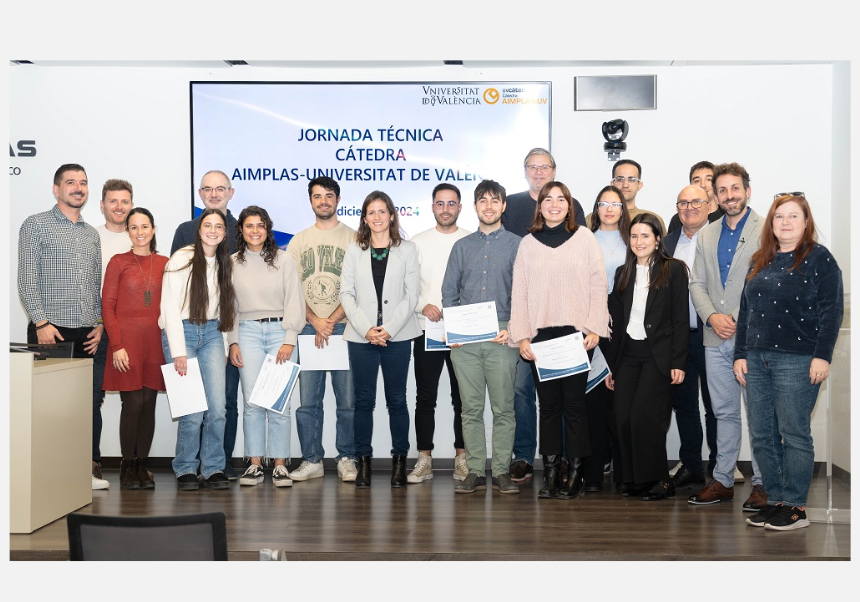
The AIMPLAS-UV Chair held on 10 December 2024 the first edition awards ceremony, highlighting among the awarded list of candidates projects that encourage the use of AI to improve plastic waste management, as well as sustainable solutions for a circular economy such as the plastic membranes to capture CO2 or coverings done with this material capable of storing latent heat.
It is a newly incorporated award of the AIMPLAS Chair, the Technological Institute of Plastics, and the Universitat de València (UV) to reward academic excellence in the undergraduate degree final projects (TFG) and master's degree final projects (TFM) related with circular economy within the plastics industry.
This first edition had 15 projects that showed the commitment of the students to effort and innovation as well as their commitment to the development of sustainable solutions to give an answer to the current challenges faced by the plastics industry.
Young talent next to the AI
The first prize was given to a student from Cuenca, Alex Planas Martínez, who has done a master's degree in Chemical Engineering at the UV and produced his final project about “The implementation of NIR and Artificial Intelligence based techniques in the process of selection of polyethylene packaging waste”. Planas highlighted that: “I’ve implemented optical techniques similarly to artificial vision cameras to differentiate the packaging in contact with food than those who haven’t and recycle those wastes so that they could be use with the same goal in mind as their were created”. As a result, the youngster has confirmed that with this project “a great amount of wastes generated in the packaging sector will be able to be recycled”.
The second prize has been given to a student from Villareal, Gorka Marco Velasco, for his Chemical Engineering UV master's degree final project about the ‘Use of ionic liquids and deep eutectic solvents for the preparation of polymer-based membranes for decarbonisation technologies’, focused on the development of polymer membranes for CO2 capture. Marco explained that “if this technology is made available to the industry, they could recover the greenhouse effect gases, and thus stop emitting them into the atmosphere”.
Finally, the third place was given to a student from València, Paula Gómez García, for her final project of the university master's degree in Chemistry at the UV about “Polymer coating capable of storing latent heat”. Gómez said that “these coatings, when melted, increase in temperature and absorb energy, but when solidified their temperature decreases, thus emitting the absorbed energy”.
Nowadays, one of the problems we face globally is the usage of fossil fuels, thanks to which we obtain most of the energy and thermal energy for our homes. Therefore, with this polymer coating we can create alternative to acclimatise households without the need to use these limited natural resources that, actually, aren’t properly treated and pollute the environment after being used by us.
Additionally, seven honorary mentions were given to highlight the quality of other proposals: ‘Integració de materials de canvi de fase en recobriments de sistemes tèxtils’ (Eric Fuster Navarro), ‘Preparación de membranas hidrofóbicas de PVDF con disolventes verdes y adición de polietilenglicol y glicerol como formadores de poro’ (Alejandro Gálvez Subiela), ‘Computational modeling of the enzymatic mechanism of polyethylene terephthalate degradation’ (Laura Granero Parejo), ‘Encapsulación de compuestos agroquímicos en lignina mediante métodos coloidales’ (José Huerta Recasens), ‘Desarrollo de materiales funcionales a partir de residuos de biomasa’ (Lucía López Lucas), ‘Diseño de una planta de reciclaje de tereftalato de polietileno’ (PET) (Lucía Mora Fernández) and ‘Reciclaje químico de residuos textiles mediante líquidos iónicos’ (Javier Gonzalo Young).
A high level jury
The evaluation of the projects has been done by a jury composed of four specialist from the academic and technological field. These were Marina Patricia Arrieta Dillón, Associate Professor I3 of the Polytechnic University of Madrid, Luis Cabedo Mas, full-time university professor of the Universitat Jaume I, Vicent Fombuena Borrás, Associate Professor of the Universitat Politècnica de València, and Laura Santoja Blasco, Researcher at Polymer Char: Laboratory Instruments and Analytical Services. Everyone highlighted the great technical and scientific quality of the proposals, as well as their approach towards critical sectors such as recycling, sustainability and polymer materials innovation.
During the awards ceremony, after the AIMPLAS and the Chair presentations, Adrián Morales, head researcher of the Mechanical Recycling at AIMPLAS, gave a conference about the valuation of plastic wastes.
Betting for talent and sustainability
With these awards, AIMPLAS and the Universitat de València strengthen their commitment to the training and encouragement of young talent. According to the words of AIMPLAS-UV Chair Head, José Badia, “these awards are not only a recognition of the students efforts, but also a contribution to the advancement of circular economy, a key aspect for the sustainability of the plastics industry”.
The AIMPLAS-UV Chair has as its objective to strengthen the connection between the academic fields and the industrial sustainability, innovation and circular economy needs. Through initiatives such as these awards, we want to encourage the generation of knowledge and the search of innovative solutions for the challenges of the industry.




